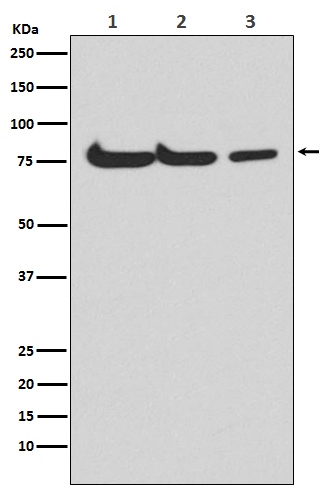
| WB | 咨询技术 | Human,Mouse,Rat |
| IF | 咨询技术 | Human,Mouse,Rat |
| IHC | 咨询技术 | Human,Mouse,Rat |
| ICC | 1/50-1/200 | Human,Mouse,Rat |
| FCM | 咨询技术 | Human,Mouse,Rat |
| Elisa | 咨询技术 | Human,Mouse,Rat |
| Aliases | hAGP7; Ubiquitin-activating enzyme E1-like protein; APG7L |
| Entrez GeneID | 10533 |
| WB Predicted band size | Calculated MW: 78 kDa; Observed MW: 78 kDa |
| Host/Isotype | Rabbit IgG |
| Antibody Type | Primary antibody |
| Storage | Store at 4°C short term. Aliquot and store at -20°C long term. Avoid freeze/thaw cycles. |
| Species Reactivity | Human,Mouse,Rat |
| Immunogen | A synthesized peptide derived from human Atg7(Apg7) |
| Formulation | Purified antibody in PBS with 0.05% sodium azide. |
+ +
以下是3条与ATG7抗体相关的参考文献示例(注:内容基于学术文献的常见主题,具体细节需参考原文):
---
1. **文献名称**:*Autophagy: Cellular and Molecular Mechanisms*
**作者**:Yoshinori Ohsumi
**摘要**:该综述系统阐述了自噬的核心分子机制,重点分析了ATG7在自噬体形成中的关键作用,并讨论了使用ATG7抗体检测自噬通量的实验方法及其在疾病模型中的应用。
2. **文献名称**:*Loss of autophagy in the central nervous system causes neurodegeneration in mice*
**作者**:Noboru Mizushima, Beth Levine 等
**摘要**:通过构建中枢神经特异性敲除ATG7的小鼠模型,研究证实ATG7缺失导致自噬障碍,引发神经元内异常蛋白聚集和神经退行性病变。研究中使用ATG7抗体验证了蛋白表达缺失,并关联其与病理表型。
3. **文献名称**:*ATG7-dependent autophagy suppresses tumorigenesis in a murine model of pancreatic cancer*
**作者**:Alec Kimmelman 等
**摘要**:该研究揭示了ATG7在胰腺癌中的抑癌作用,通过ATG7抗体检测发现其表达水平与患者预后相关。实验表明,ATG7缺失导致自噬抑制,加速肿瘤生长和代谢异常。
---
**提示**:以上为模拟示例,实际引用请通过PubMed或Google Scholar检索具体文献(关键词:ATG7 antibody, autophagy, [研究领域])。
ATG7 is a key autophagy-related protein that functions as an E1-like activating enzyme in the ubiquitin-like conjugation systems essential for autophagosome formation. It catalyzes the lipidation of LC3 (Microtubule-associated protein 1A/1B-light chain 3) and the covalent conjugation of ATG12 to ATG5. both critical steps in autophagosome membrane expansion and cargo sequestration. Dysregulation of ATG7 has been implicated in various diseases, including cancer, neurodegenerative disorders, and metabolic conditions, highlighting its role in maintaining cellular homeostasis.
ATG7 antibodies are widely used tools in autophagy research to detect and quantify ATG7 protein levels in cells or tissues. These antibodies enable techniques such as Western blotting, immunohistochemistry (IHC), and immunofluorescence (IF) to study autophagy dynamics under physiological or pathological conditions. Specificity and validation are crucial, as off-target binding may lead to misinterpretation of autophagy activity.
Research using ATG7 antibodies has advanced our understanding of tissue-specific autophagy mechanisms and therapeutic targeting. For example, studies in conditional ATG7-knockout models rely on these antibodies to confirm protein depletion. Additionally, clinical investigations explore ATG7 expression patterns as potential biomarkers for disease progression or treatment response, emphasizing its translational relevance.
×